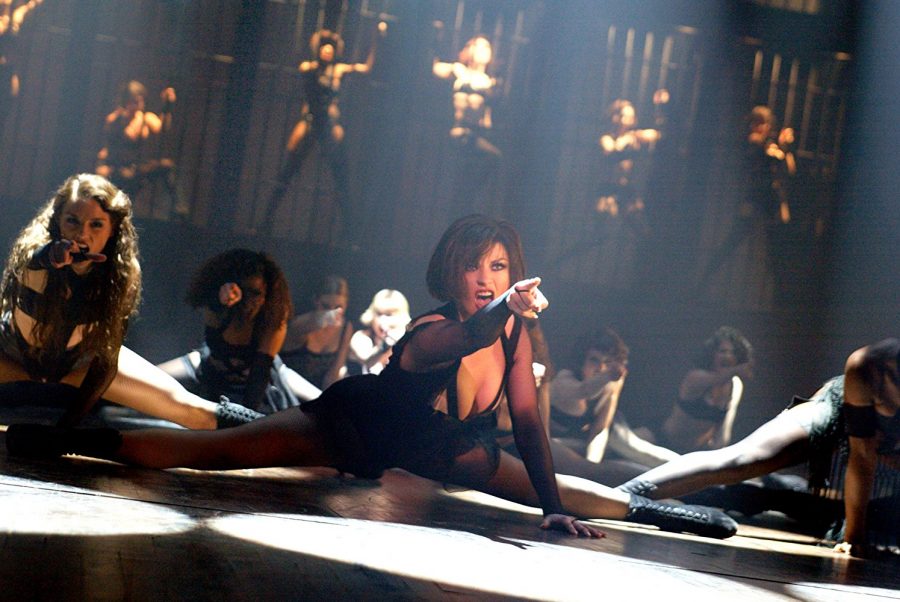Staff Recs: Hollywood Movie Musicals
Catherine Zeta-Jones as Velma Kelly in “Chicago.”
October 5, 2018
We gather here today to celebrate the life, death and rebirth of the Hollywood musical. For a prolonged period of time, the once-supreme genre was unseen in theaters across the country and abroad. Superhero franchises and Pixar diminished any chances of a musical’s success. But with Rob Marshall’s 2002 live-screen adaptation of Bob Fosse’s “Chicago,” the magic slowly made its return, with films like “Rent,” “Hairspray,” “Moulin Rouge!” and, more recently, “La La Land” following in its footsteps. Today, we are seeing an unprecedented number of musicals on both television — thanks to NBC’s live musicals — and the big screen. Tomorrow, the newest addition to the cannon makes its arrival in the form of Bradley Cooper and Lady Gaga’s reinvented fourth remake of the timeless classic “A Star Is Born.” To celebrate the genre’s imminent return, and not to mention the return of Mother Monster, here are our personal favorites from the golden age and the golden revival.
“Chicago”
Ryan Mikel, Arts Editor
If there is anyone to thank for my inclination toward movies, it is my grandma. Every birthday, holiday or special occasion, she would bestow upon me a DVD from my childhood wonderland, Sam Goody’s. To this day, the copy that I cherish the most is my two-disc, collector’s edition of Rob Marshall’s best picture-winning “Chicago.” Arguably, this film single-handedly revived the movie musical genre and not in the same lavish, sensational approach that oldies like “White Christmas” and “Singin’ In The Rain” took. No, Marshall took a very abstract and dark piece of Vaudeville-esque theater and gave it one of the most innovative and unexpected stage-to-screen adaptations in recent cinema history. Like many other works in theater –– “Rent” and “Fences” to be exact –– the stage version uses barely any scenery or props to drive its plot. It is simply an on-stage orchestra, a dozen or so chairs and heaps of glitter and lingerie. Unlike the aforementioned works that ultimately failed to translate to the big screen, “Chicago” took its minimalistic source material and created a 21st century variety show-like production, where our antiheroes Velma Kelly (Catherine Zeta-Jones) and Roxie Hart (Renee Zellweger) convey their testimonies in prison through big-number flashbacks filmed live on a stage or in the jail cells itself. (See “Cell Block Tango” for further viewing.)
Aside from the groundbreaking production design and impeccably staged musical numbers, the cast is an absolute sight for sore eyes. Zeta-Jones and Zellweger are supported by a star-studded ensemble, including Richard Gere, John C. Reilly, Taye Diggs, Christine Baranski and the film’s most valuable player, Queen Latifah. This film honestly could have been a complete disaster, but its director led it straight to six Academy Awards, three Golden Globes and three Screen Actors Guild Awards, which included the most deserving Outstanding Performance by a Cast in a Motion Picture received by an ensemble in the award’s 24-year existence.
“Enchanted”
Guru Ramanathan, Film & TV Editor
We all love Amy Adams. The actress has consistently proven to be one of the best talents in the industry today and has been nominated for an Oscar five times for starring in heavy dramas like “The Fighter” and “The Master.” But the film that propelled her into stardom was 2007’s “Enchanted,” a wonderfully directed and acted musical film that pays homage to and self-parodies classic Disney animated films. Adams plays Giselle, an animated Disney princess who is forced to navigate the live-action world of New York City with the help of a cynical divorce attorney (Patrick Dempsey). While the movie begins like a typical Disney animated film, “Enchanted” successfully subverts long-standing tropes of the naive Disney princess archetype and parodies several classics, notably “Snow White and the Seven Dwarfs” and “Sleeping Beauty.” Disney has been producing modern retellings of many of their old movies like “Cinderella” and “Beauty and the Beast,” but to this day “Enchanted” is one of the few princess films under their banner — alongside perhaps “Tangled” and “Princess and the Frog” — that is actually intelligent about the way it improves upon the original stories while still being fun and wholly imaginative. Giselle’s fish-out-of-water situation never gets old thanks to a solid writing and the infectious chemistry between Adams and Dempsey. “Enchanted” also boasts a number of great songs composed by Alan Menken, the maestro behind several Disney films like “The Little Mermaid” and “Aladdin,” three of which were nominated for Oscars.
“Hairspray”
Ali Zimmerman, Deputy Arts Editor
I blame “Hairspray” for my middle school theater phase. The 2007 film version is nothing short of a Hollywood masterpiece, stacked with superstars perfectly cast and musical numbers that stick in your head for weeks after viewing. Zac Efron is swanky and greasy haired as ever playing Corny Colin’s Show dancer and pretty-boy Link Larkin. James Marsden, Queen Latifah and Christopher Walken also prove themselves as triple-threats, singing and dancing through a soundtrack that drips with ’60s bounce and early rock energy. The story also tactfully addresses issues surrounding beauty standards and racial inequality without losing the fun. In many cases, when a musical is brought to the big screen and the magic of live performance is stripped away, the result is a lackluster. This is not the case with “Hairspray.” Pastel tinted visual effects and grandiose sets bring the viewer on a real journey of the sights, sounds and social landscape of the ’60s. The only thing I could do without is John Travolta playing a woman in fat suit. He’s creepy enough as it is.
“Cabaret”
Alex Cullina, Books & Theater Editor
Liza Minnelli’s masterful Oscar-winning performance as the iconic character of Sally Bowles is the reason many people know Bob Fosse’s 1977 classic. Minnelli effortlessly embodies by turns wide-eyed innocence, sly sexuality, and heavy world-weariness. But the rest of the movie ain’t bad either. Set in Weimar Berlin during the rise of the Nazis, the film follows the freshly arrived Brian (Michael York), a stiff, sexually confused Brit, and his friendship with Sally, a lovable American cabaret singer who performs nightly at the titular Kit Kat Club. Hosted with aplomb by the Emcee (a fantastic Joel Grey, always with a Cheshire grin), the club is a delightful den of vice, extravagance and sex. The musical numbers like “Willkommen,” “Maybe This Time,” and “Cabaret” are a delightful showcase for Minnelli’s and Grey’s immense vocal talent, but Fosse’s deft direction also injects the manic energy of a night on the town. The film revels in the griminess of Berlin’s underground, but that doesn’t mean it avoids heavier stuff. With plot points involving Nazism, anti-Semitism, homosexuality and abortion, the film’s light, joyful elements are grounded in the darker outside world, with the end of the film subtly hinting at what’s to come in Germany’s near future.
“Bye Bye Birdie”
Ryan Mikel, Arts Editor
Picture this: a freshly 21-year-old Ann-Margret crooning her goodbyes to America’s favorite rockstar-turned-drafted-soldier Conrad Birdie (Jesse Pearson) as she runs around giddily on a gargantuan, blue soundstage. This opening scene may not translate well into words, but on screen, it provided the most marvelous and memorable cinematic moment for a flamboyant 8-year-old growing up in rural Mississippi. From here on out, my dream was to be onstage and feel the magic I witnessed in “Bye Bye Birdie” in any possible capacity. This great American musical is the literal definition of a great American musical. The story mirrors that of Elvis Presley’s and follows a town’s reaction to the drafting of a Presley-like Conrad Birdie into the United States Army. It is a very nuanced story, and the action doesn’t just revolve around one girl’s obsession with her war-bound rock idol. Instead, it weaves together storylines connected by classic Hollywood musical numbers filmed on a Columbia Pictures soundstage in glorious 35mm technicolor. Musical numbers like “The Telephone Hour” and “Shriner’s Ballet” have consistently inspired musical numbers throughout the course of movie history –– a more recent example being the opening scene of “La La Land.” Aside from the technical work, the performances (Dick Van Dyke and Janet Leigh) and choreography give every musical around this time (“West Side Story,” “My Fair Lady” and “The Music Man”) an absolute run for their money. It’s a shame not more people know about this iconic entry in the cannon of Golden Age movie musicals.
“Grease”
Daniella Nichinson, Arts Editor
There’s something irresistible about John Travolta circa-1970s. Between “Saturday Night Fever” and “Grease,” Travolta showed off his remarkable talent for disco and dance, and that dark elephant trunk hair. “Grease” is a film I have watched with absolute delight since my adolescent years. The 1950s high school setting serves as fertile ground for the birth of cool. The greasers and the Pink Ladies rule the food chain and show off their status through a number of catchy musical numbers. From “Greased Lightnin’” to “Beauty School Dropout,” “Grease” boasts a plethora of ranging melodies and feelings that convey emotions of heartbreak, hopefulness and adoration. No matter how many times you’ve seen the film, you can’t help but belt out the lyrics to “We Go Together” alongside the cast as you cheer for the inevitable reunion between Danny and Sandy.
Email the Arts Desk at [email protected].































































































































































